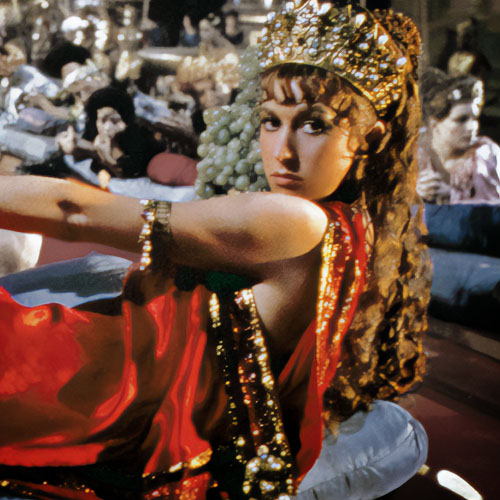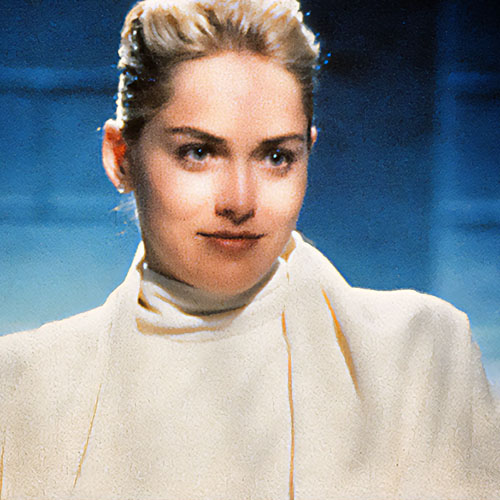Caligula was Bob Guccione’s cinematic debut, now we are revealing the never-before-seen footage of this erotic cultural sensation.
Reliving Penthouse Classic Cinema
It was the boldest move in cinema history: presenting the most celebrated and respected actors of the day in a film that could only be described as pornographic. Bob Guccione, founder of this magazine, set his sights on decimating the boundaries between art, sex, and cinema and succeeded to such a potent degree that even 40 years later, no theatrical event has come close to matching the scope and scandal of Caligula.
Writer Gore Vidal was one of the most distinguished literary minds of his time; his daring 1964 novel Julian famously compared the decadence of modern society to fourth-century Rome, making him a logical choice for producer Franco Rossellini to bring on board to script Caligula. Vidal, rooted in the reputable culture surrounding a best-selling author, described his script as “an analysis of how power corrupts,” and envisioned Caligula as a historically accurate, visually traditional, and wholly serious film documenting the actions of the most debauched and sadistic ruler in history.
Guccione, while complimenting Vidal as an “intellectual colossus” and “formidable historian,” wanted to push the boundaries of cinema, and after agreeing to join the production as financier and producer, hired critically acclaimed auteur of avant-garde cinema Tinto Brass as director. Aligned with Guccione, Brass imagined the film as a bombastic satire on the corrupting influence of power, retooling the script to emphasize the complicity of the senate and bringing on board Academy Award-winning set designer Danilo Donati to construct grand, expansive sets suggesting the excess and flamboyance of the Roman Empire.
At various points, Mick Jagger and Jack Nicholson were rumored to be in the running for the titular role. But the dubious honor of portraying one of the most nefarious men in history ultimately went to Malcolm McDowell, a young English actor riding high in Hollywood from his landmark role as the amoral lead in Stanley Kubrick’s A Clockwork Orange. Teresa Ann Savoy, who had starred in Tinto Brass’s previous film, Salon Kitty, portrayed Caligula’s sister. The cast also included John Steiner as the cunning and ambitious advisor Longinus, and three British acting icons: Helen Mirren as Caligula’s promiscuous wife, Caesonia; Sir John Gielgud as Nerva, the wise and impertinent imperial counselor; and Peter O’Toole as syphilitic Emperor Tiberius.
From sets to costuming, no expense was spared in the extravagant production, but the differences between Caligula and a traditional epic film were immediately noticeable. In addition to the presence of a curated collection of exotic Penthouse Pets on-screen, McDowell remembered: “I’d look over and there would be two dwarves and an amputee dancing around some girls splayed out on a giant dildo.” When the very respectable Sir Gielgud arrived on set, O’Toole prodded, “Hello, Johnny! What’s a knight of the realm doing in a porno film?”
Helen Mirren recalled naked bodies everywhere, expressing that the experience of making Caligula “was like showing up for a nudist camp every day. You felt embarrassed if you had your clothes on in that movie.” She cheekily added, “It was like being sent down to Dante’s Inferno.”
With production underway, the budget quickly ballooned to twice that of Star Wars, and Guccione later complained that enough footage was shot to “make the original version of Ben-Hur about 50 times over.” Filming was rife with conflict: Vidal and Brass butted heads constantly, leading to the director banning Vidal from the set; and a spiteful Donati got a jab in by building the major set piece of Caligula’s pleasure ship at such an enormous scale that it filled the entire production studio, ensuring that the massive creation was nearly unfilmable and limiting the furious director considerably.
The mighty triumvirate of Vidal, Brass, and Guccione was a marketing dream come true: three titans in their respective fields, united for a creation unlike anything seen before on the cultural landscape–certainly unique in film history. Caligula, however, would end with two of the three creators forcibly distancing themselves from the finished film.
As soon as filming was completed, Brass was unceremoniously fired, and it was revealed that Guccione had been shooting hard-core pornographic scenes on the multimillion-dollar sets at night with the intention of overseeing completion of the movie himself. The end result was a curiously edited version of the film — heavy on spectacle, light on continuity. Brass was understandably devastated, and sued to have his name removed as director of a film so far afield from his vision.
Vidal was likewise infuriated by the developments surrounding Caligula, and also sued to have his credit removed. “My name is being used to give prestige to a pornographic film which could be denounced for obscenity,” he complained, adding that “‘Caligula’ is Latin for ‘turkey.’”
In the end, the film’s script was credited as being “adapted from a screenplay by Gore Vidal,” and Brass’s credit was changed to “principal photography by.” Only Guccione stood by the finished product, placing his name above the title as “Bob Guccione presents” and crediting himself with “additional scenes by.” Guccione oversaw a series of editors on the movie, with no one accepting final responsibility; in the end, the film bore the simple credit of “edited by the production.”
The finished version of Caligula premiered in the U.S. on February 15, 1980. Critics immediately picked up on the troubled production. Roger Ebert called it “worthless,” yet admitted that as he exited the theater, hundreds of people were lined up, waiting to see the film. Even with the $7.50 ticket price (double the cost of a regular movie ticket), attendance was so high and screenings so frequent that the film reels quickly needed to be replaced from wear. “History is filled with their nameless gravestones,” Guccione said of the critics, “while the names of the men and women they spent their lives attacking live on.”
Malcolm McDowell, for his part, stands behind his performance in the film, commenting, “I’m proud of the work I did in Caligula. There’s no question about that.” But he also says the Guccione-edited release was “an absolutely outrageous betrayal and quite unprecedented.”
Caligula has anchored one of the most enduring speculative discussions in cinematic history: What could the film have been if completed by other hands? Now, a monumental development will provide an answer to this long-standing question about a different final shape for this controversial creation. For the film’s 40th anniversary, Penthouse has opened the vaults containing the original camera negatives — long believed to have been lost — and a new edit conforming to Gore Vidal’s script is being produced by author and filmmaker Thomas Negovan and director E. Elias Merhige.
This new 40th anniversary version, titled Caligula MMXX, is Penthouse’s first feature-film production since the original Caligula premiered, and will be unveiled in a limited theatrical release in the fall of 2020.
“The story of Penthouse’s Caligula is legendary,” says Negovan. “It occupies a unique place in movie history as being widely considered both the worst film in history and also very possibly the finest film never completed. Of course the opportunity to help bring into the world what we’ve all imagined this film could be was a priceless honor. The immaculate footage we’ve uncovered confirms McDowell’s statement of pride: scene after scene reveals an incredibly dedicated and gripping performance.
“With 96 hours of footage and so many disparate opinions clashing and boiling over during the actual filming process,” Negovan continues, “this isn’t just a film restoration project, it’s an archeological dig. It’s been thrilling beyond words to see so many scenes that had long been thought lost forever — hours and hours of absolutely magical performances by Helen Mirren, Sir John Gielgud, Peter O’Toole, and John Steiner, all unseen since they were performed on set over four decades ago. This resurrection of a lost masterpiece will be the most important film event of the year.”
It’s a thrilling turn of events, this new life for a boundary-breaking, fiercely debated film. Stay tuned for more information on its autumn debut.
Sign up for news and updates on “Caligula MMXX” at caligulammxx.































Where can I buy it.
When we know, we will definitely let you know here.